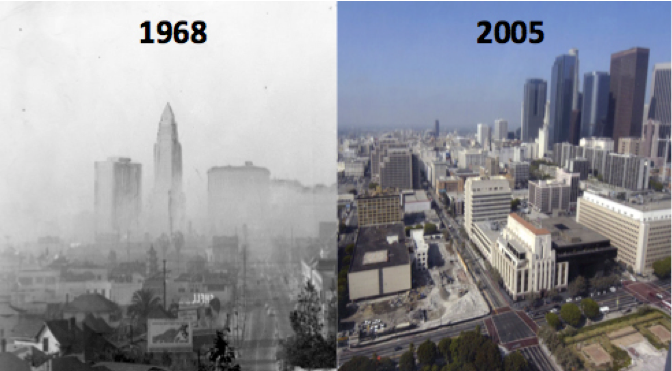CommentsCALWATCHDOG--President Trump on Wednesday launched the first salvo in what seems likely to end up a war with the state of California and many liberal states over vehicle mileage rules that Gov. Jerry Brown and environmentalists depict as crucial to control pollution and to reduce the emission of gases believed to contribute to global warming.
At a ceremony at a Detroit-area auto facility after meeting with auto executives, Trump declared his intention to pursue “fair” regulations that “protect and defend” jobs.
Before his remarks, Trump staffers gave background briefings to reporters on his plans to scrap mileage rules approved by President Obama’s EPA in his final weeks on the job. The new rules would require cars and small trucks to average 54.5 miles per gallon in 2025, up from the present 36 miles per gallon.
Automakers were unhappy with the Obama administration’s speedy decision-making – new rules weren’t required until 2018. They believe the rules will require them to sell vehicles Americans don’t want to buy in an era in which gasoline prices are low and relatively stable because of a heavy increase in domestic oil production. Warning that the new rules would put more than 1 million jobs at risk, automakers have been lobbying Trump since they were enacted.
Brown administration officials have already filed a challenge to Trump’s directive, according to the Los Angeles Times. “Any weakening or delay of the national standards will result in increased harms to our natural resources, our economy, and our people,” the brief asserted.
13 states use California’s tougher standards
But while the president rattled state officials with his actions, he didn’t go as far as some environmentalists feared.
Under the federal Clean Air Act of 1970, California was given the right to waive federal vehicle mileage rules in favor of stricter standards because of the state’s severe problems with smog and ozone pollution in Southern California. The waiver allows other states to follow California’s tougher standards. Thirteen do, and as a result about 40 percent of the nation’s residents who buy about 40 percent of vehicles do so under California’s stricter rules, irking automakers who don’t like to have to deal with what are essentially two national standards.
The Trump administration could have tried to end California’s waiver entirely or prevent other states from using the Golden State’s rules. Instead, Reuters reported the administration hopes to work with the state on a compromise.
But that is close to certain to be a nonstarter, given Brown’s and the California Legislature’s approval of a law requiring the state to have greenhouse-gas emissions 40 percent below 1990 levels by 2030. Achieving that goal appears close to impossible without sharply cutting emissions from the state’s transportation sector, which generates 36 percent of California’s carbon emissions, according to the most recent statistics.
Vehicle emissions rule a potent weapon for state regulators
Stanford environmental law professor Michael Wara said tough vehicle mileage standards have been the state’s strongest tool in combating greenhouse gas emissions.
“California is going to fight, to deploy every resource it has, to keep this stuff, because this is big,” Wara told the San Francisco Chronicle.
Wednesday’s developments were foreshadowed by the January confirmation hearing of Environmental Protection Agency chief Scott Pruitt, like Trump a climate change skeptic and longtime EPA critic. Under questioning by Sen. Kamala Harris, D-San Francisco, Pruitt refused to say whether the Trump administration supported allowing California to continue to waive federal air pollution rules in favor of tougher standards.
Given that California’s waiver is written into federal law, it is unclear whether the Trump administration could force the state to follow federal rules. In 2008, George W. Bush’s administration challenged new state rules, prompting a lawsuit from then-Attorney General Jerry Brown that was joined by 15 other states. But no court decision was forthcoming before Barack Obama succeeded Bush the following year. The Obama administration quickly dropped the challenge
(Chris Reed is an editorial writer for U-T San Diego and a contributor to CalWatchdog … where this perspective was first posted.)
-cw
Sidebar
Our mission is to promote and facilitate civic engagement and neighborhood empowerment, and to hold area government and its politicians accountable.

 CityWatch Los Angeles
Politics. Perspective. Participation.
CityWatch Los Angeles
Politics. Perspective. Participation.
14
Sun, Dec













